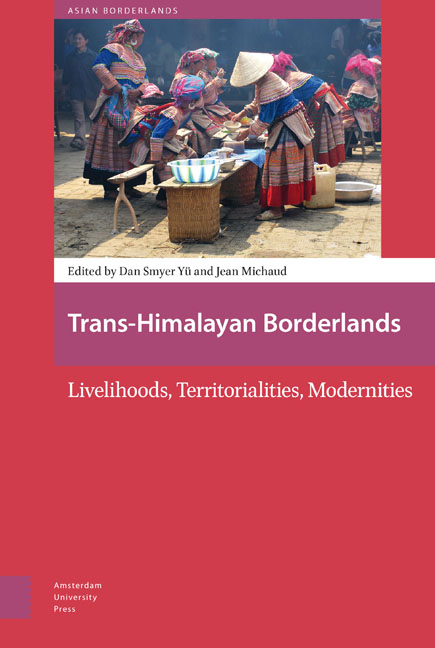Book contents
- Frontmatter
- Contents
- Acknowledgements
- Introduction: Trans-Himalayas as Multistate Margins
- I Territory, Worldviews, and Power Through Time
- 1 Adjusting Livelihood Structure in the Southeast Asian Massif
- 2 The Properties of Territory in Nepal’s State of Transformation
- 3 Trans-Himalayan Buddhist Secularities: Sino-Indian Geopolitics of Territoriality in Indo-Tibetan Interface
- 4 Buddhist Books on Trans-Himalayan Pathways: Materials and Technologies Connecting People and Ecological Environments in a Transnational Landscape
- 5 Seeking China's Back Door: On English Handkerchiefs and Global Local Markets in the Early Nineteenth Century
- II Livelihood Reconstructions, Flows, and Trans-Himalayan Modernities
- 6 Contested Modernities: Place, Subjectivity, and Himalayan Dam Infrastructures
- 7 Plurality and Plasticity of Everyday Humanitarianism in the Karen Conflict
- 8 Being Modern: Livelihood Reconstruction among Land-lost Peasants in Chenggong (Kunming)
- 9 Tibetan Wine Production, Taste of Place, and Regional Niche Identities in Shangri-La, China
- 10 Tea and Merit: Landscape Making in the Ritual Lives of the De’ang People in Western Yunnan
- 11 In-between Poppy and Rubber Fields: Experimenting a Transborder Livelihood among the Akha in the Northwestern Frontier of Laos
- 12 A Fortuitous Frontier Opportunity: Cardamom Livelihoods in the Sino-Vietnamese Borderlands
- Conclusion: Frictions in Trans-Himalayan Studies
- Index
10 - Tea and Merit: Landscape Making in the Ritual Lives of the De’ang People in Western Yunnan
Published online by Cambridge University Press: 12 December 2020
- Frontmatter
- Contents
- Acknowledgements
- Introduction: Trans-Himalayas as Multistate Margins
- I Territory, Worldviews, and Power Through Time
- 1 Adjusting Livelihood Structure in the Southeast Asian Massif
- 2 The Properties of Territory in Nepal’s State of Transformation
- 3 Trans-Himalayan Buddhist Secularities: Sino-Indian Geopolitics of Territoriality in Indo-Tibetan Interface
- 4 Buddhist Books on Trans-Himalayan Pathways: Materials and Technologies Connecting People and Ecological Environments in a Transnational Landscape
- 5 Seeking China's Back Door: On English Handkerchiefs and Global Local Markets in the Early Nineteenth Century
- II Livelihood Reconstructions, Flows, and Trans-Himalayan Modernities
- 6 Contested Modernities: Place, Subjectivity, and Himalayan Dam Infrastructures
- 7 Plurality and Plasticity of Everyday Humanitarianism in the Karen Conflict
- 8 Being Modern: Livelihood Reconstruction among Land-lost Peasants in Chenggong (Kunming)
- 9 Tibetan Wine Production, Taste of Place, and Regional Niche Identities in Shangri-La, China
- 10 Tea and Merit: Landscape Making in the Ritual Lives of the De’ang People in Western Yunnan
- 11 In-between Poppy and Rubber Fields: Experimenting a Transborder Livelihood among the Akha in the Northwestern Frontier of Laos
- 12 A Fortuitous Frontier Opportunity: Cardamom Livelihoods in the Sino-Vietnamese Borderlands
- Conclusion: Frictions in Trans-Himalayan Studies
- Index
Summary
Abstract
De’ang is a Mon-Khmer-speaking people who, known for their tea farming livelihood, reside in the subtropical monsoon uplands of southwestern Yunnan bordering with Myanmar. For the De’ang, tea is not only a traditional farming crop for their market exchange, but is also an embodiment of their cultural memories and religious practice. This chapter demonstrates that the De’ang often use tea as an important object of Buddhist offering rituals to yield merit for their lives. This ritual practice produces what the author called ‘merit-landscape’ in their living space. Based upon the author's ethnographic research, this chapter argues that the merit-landscape making conceived in De’ang tea-offering rituals exposes an ecological image with indigenous cultural practices. The manner in which the De’ang balance their morality and the scale of their tea farming in their living space in relation to the impact of development on their transregional livelihood reflects their way of keeping a sustainable relationship between people and environment.
Keywords: tea, merit, landscape, ritual, livelihood
Introduction
Tea, produced from a member of the Camellia genus of flowing plants, is a common consumer product in China, generates revenue for the national economy, and possesses social functions such as gift exchange in the Chinese practice of etiquette. Southwest China is regarded as one of the original places of tea cultivation. Some very old tea trees, planted around 1000 BC, are found in Sichuan and Yunnan (Chow and Kramer 1990; Wang 1992). Tea as a national commercial product can be dated back to the tea-horse trade between the Chinese dynasties and Tibetan empire. Today, the history of the tea-horse trade is being revived to explain the historical caravan trade between Yunnan and Tibet and is being used to expand the current tea market.
Of China's 55 official ethnic minorities, fifteen are indigenous to Yunnan. Under the western region development strategy implemented by the central government, the Yunnan provincial government has made great efforts to promote both tea trade and tourism. While the government focused on exploiting tea and ‘exotic ethnic culture’ for Yunnan's economic development, private businesses also began to recognize the lucrative trade in tea made in the ethnic minority areas, resulting in a variety of locally produced teas that have begun to be sold in restaurants and cafés.
- Type
- Chapter
- Information
- Trans-Himalayan BorderlandsLivelihoods, Territorialities, Modernities, pp. 229 - 242Publisher: Amsterdam University PressPrint publication year: 2017



